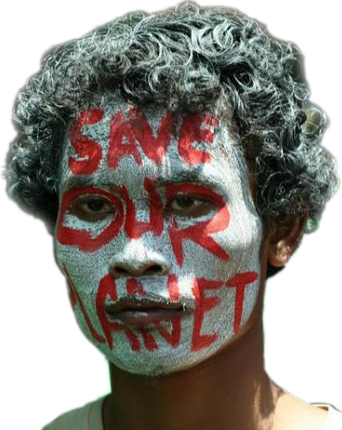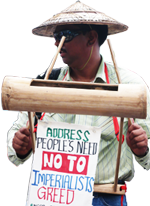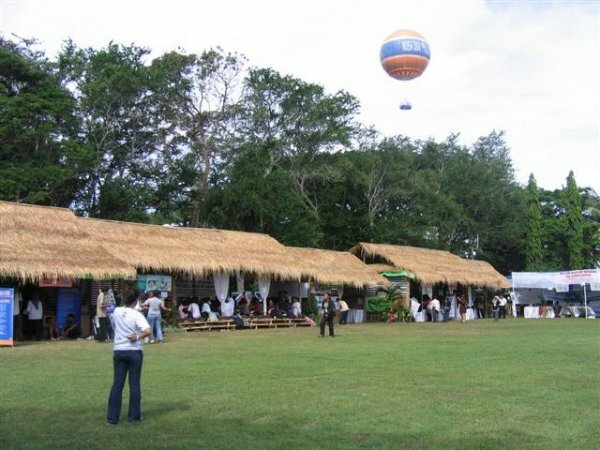Who we are
 The Peoples' Movement on Climate Change (PMCC) seeks to advance the People's Protocol on Climate Change as the Southern peoples' strategy and response to the climate change issue.
The Peoples' Movement on Climate Change (PMCC) seeks to advance the People's Protocol on Climate Change as the Southern peoples' strategy and response to the climate change issue.
What we advocate
|
The Peoples' Protocol on Climate Change (PPCC) aims to involve the grassroots sectors in the climate change discourse by developing their capacities for engagement and action. It also aims to pressure governments and international bodies to put the people's perpectives and aspiration on the negotiating table in drawing up a post-2012 climate change framework. |
Arabic English Amharic Bengali Spanish Francais for printing |
Why we advocate

The people are the worst affected and yet are the least empowered. It is urgent, more than ever, for the people to unite and create their own spaces to raise their own concerns and issues on climate change.
Member Login
Syndicate
PPCC's five-point platform for action
- Comprehensive and concerted but differentiated and equitable global effort to achieve deep, rapid, and sustained emissions reductions to stabilize CO2 concentrations at 350ppm and hold global average temperature rise to 1.5 degrees Celsius.
- Demand the reparation of Southern countries and the poor by Northern states, TNCs, and Northern-controlled institutions to redress historical injustices associated with climate change.
- Reject false solutions that allow Northern states and corporations to continue harming the environment and communities, provide new and greater opportunities for profit, and reinforce and expand corporate control over natural resources and technologies.
- Struggle for ecologically sustainable, socially just, pro-people, and long-lasting solutions.
- Strengthen the peoples' movement on climate change.
| TWN Panama News Update No.16 |  |
 |
| Thursday, 13 October 2011 13:38 | |||
|
11 October 2011 Strong call for decision on funding for forest-related activities
Panama City, 10 October (Majorie Williams) – A vast majority of Parties at the informal group on reducing emissions from deforestation and forest degradation in developing countries (REDD-plus), supported a decision on in Durban to finance its full implementation.
Parties explored financing options for results-based actions in implementing forest-related activities and considered what results-based actions were. Following the informal group meeting, the facilitator, Mr. Antonio La Vina of the Philippines, was able to produce a non-paper which was a “placeholder text” which was an outline rather than a negotiating document. The facilitator asked Parties to submit views and proposals which the secretariat will compile so that Parties can begin work in having a full text for negotiations in Durban.
The informal group on policy approaches and positive incentives on issues related to reducing emissions from deforestation and forest degradation in developing countries (REDD- plus) had its third meeting on October 6. The key points under discussion were: (1) diversity of source for REDD-plus finance, (2) the definition and scope of result based activities and actions and (3) the linkage with the Green Climate Fund.
All Parties agreed that there should be a diversity of sources of funding for REDD-plus activities, including public and private finance, with most developing countries stressing for public sector funding to be the major source of funding and the private sector funding being complementary. Many developing countries (including Ecuador, Guyana, India, Indonesia, and the Philippines) agreed that there should be a REDD-plus window built into the institutional framework of the Green Climate Fund (GCF).
Brazil on the other hand did not support a separate window for REDD-plus in the GCF but said that funding for forest-related activities could come under the general mitigation window. Japan however saw the private sector and the market as being the main source of funding for the full implementation of REDD-plus activities.
Many countries also said that results-based activities should not only be confined to looking at forest carbon stocks but also encompass the role forests played including in adaptation, biodiversity conservation and the provision of ecological services.
Papua New Guinea said that on the diversity of sources for funding, the public source could not do it alone. PNG noted that the financial crisis in the European Union and the United States and their resort to stimulus for their economies made it difficult for them to provide adequate and sustainable resources. Hence, there was a need for private sources including market sources. It also said that these were options and could not be imposed on all countries. It further noted that there was also a need for a robust measurement, reporting and verification (MRV) process that complied with international standards and safeguards. On the issue of the scope of results-based action, PNG said that it should include conservation management and forest stock as well as wider ecological services of the forest. On links with other institutional bodies such as the GCF, it noted that the Transitional Committee was dealing with that and therefore, this group should focus on REDD-plus but called for an independent window under GFC for REDD-plus, which addresses both adaptation and mitigation.
Guyana also said that given the macroeconomic problems of western governments, the sources of financing for the full implementation of REDD-plus are twofold, public and private. It said both are necessary and complementary. It believed that public sources of finance would be the vehicle for incentivizing major of forest efforts while private, or market sources would contribute to financing other REDD-plus activities, such as services. It wanted a voluntary and flexible financing arrangement.
The European Union in its intervention agreed to the chair having the mandate to prepare text. It supported a diversity of sources of funds for REDD-plus. It said the majority of public funds should be sourced through bilateral and multilateral arrangements. It noted that the G-20 has undertaken interesting work on possible sources of funds from innovative sources. It said that different sources of funds will focus on different aspects of REDD-plus and called for strict accounting rules in forests and having solid national REDD-plus policy was important. It said that the results should be assessed against social and environmental concerns and safeguards and that effectiveness required broad local participation. For the EU, what was unique in REDD-plus finance was that it goes beyond mitigation to include adaptation, biodiversity conservation, diverse benefits to the ecosystem etc. It said that REDD-plus activities attracted the active interest of the private sector. It noted that the issue of results-based payments was more of a general finance discussion and that the GCF should provide recommendations about how to fund REDD-plus activities.
India remarked that funding for REDD-plus should be from all kinds of sources, both public and private, with public sources being both through bilateral and multilateral, whereas the private sources should be market based. India further noted that both public and private should come under UNFCCC channels and framework. India also disagreed with EU about the scope of results-based action belonging to the general finance and that was a matter that should be discussed within the context of the AWG-LCA.
It noted that results-based activities is different from the different phases of REDD and that a larger quantum of resources would be needed. India supported call for a REDD- plus window in the GFC.
Norway supported the call for funds from a diversity of sources. It however cautioned against running to the market and to offsets as there are many other options to be explored including innovative financing. It cautioned that there are certain conditions to be met in relation to relying on the market with regard to environmental integrity. It said that broad access to REDD-plus has to be worked on in order to build up a robust system for safeguards. It noted the safeguards and the MRV discussion under the subsidiary body and looked forward to the discussions of the expert meeting. The scope of results-based actions must cover all five activities of REDD-plus. With regard to institutional linkages, Norway wanted to see the overall picture including the GCF. It also stressed the importance of ensuring environmental integrity and multiple benefits of REDD-plus.
Indonesia said that the finance should be from multiple sources –public and private and market sources being complementary. It said that all activities should be covered. It cited the unique nature of REDD- plus which included a number of dimensions; it was not only about forest products but also services. It supported a window for REDD-plus in the GCF and implored the group to continue to consider all possible resources.
Ghana supported a variety of financial source both public and private. It said that results-based action should cover all five activities and be consistent with real and variable computed reference level, MRV compliance, respect for safeguards in terms of community participation and environmental integrity. It noted the uniqueness of REDD-plus finance and supported the call for a window in the GCF. Ultimately, it said that REDD-plus action is dependent on adequate financing.
China supported a decision regarding financial sources and activities. It said that that the scope of finance for REDD-plus should follow from the Cancun decision on scope. It also supported a REDD-plus window in the GCF.
Sudan in its intervention said that provision of financial resources must be transparent, measurable and mainly form public sources, complemented by private sources.
Australia acknowledged the unique status of REDD-plus and recognized the need for different sources of finance, both public and private. It also noted the need for swift and transparent disbursement of funds and that the private sector will be critical.
El Salvador said that more discussions and clarification on the linkage of REDD-plus to adaptation is needed. It noted that this was a critical linkage that fitted directly to the issue of restoration and enhancement of carbon stocks. It noted that in other forums (such as the Convention on Biological Diversity) the topic of restoration was included as an important issue. It urged that the chair's non-paper to include this issue. It ended by highlighting that forestry was important to the security of livelihoods.
The Philippines supported a diversity of sources public and private, but it noted that for some aspects of REDD-plus, the bigger part is to come from public sources. Philippines said that there was a need to explore more creatively the different source of private funds as it could not simply be carbon offsets. There was need to further elaborate what are private sources. On the matter of results-based activities, the Philippines remarked that a full range of option needs to be supported. It noted that that results need to address the drivers of deforestation, the issue of opportunity costs in addressing the drivers of deforestation, land tenure, and gender consideration (in terms of equitable sharing of resources). On the matter of safeguards, the Philippines noted that the readiness phase shows that a lot of resources are needed. It pointed out that it was important to go back to the baseline issues. Hence, results-based actions are not totally separated from the earlier phases. There are lessons to be learned that will impact the third phase. As with the many other developing countries, the Philippines supported a window in the GCF. It also gave the mandate to the chair to prepare a placeholder text.
Ecuador emphasized the urgency of the decision in Durban on financing short, medium and long term (that is predicable). It said that it has almost exhausted its funding and without further support, it could not achieve activities in a timely manner. Ecuador supported various sources of funds as well as a window in the GCF.
The United States said there was need for a variety of sources to meet the diversity of needs and action for REDD-plus. With regard to results-based approaches, it said that it did not want to duplicate what is happening in other fora. It remarked that there were many options to be explored including the GCF. It said a window is a narrow element of the wider architecture. It said that there was need to attract the private sector to the table to incentivize it. It called for using public funds to leverage private sector.
Thailand supported public and private sources of funding and also supported a window for REDD-plus in the GCF.
Vietnam also supported diversity of funding for REDD-plus including public and private. On the scope of results- based approaches, it said that it was important to ensure that local communities have adequate encouragement to participate in activities. It said there is a consensus for the full implementation of REDD-plus and proposed that Durban decision on the financial mechanism.
Japan also acknowledged the uniqueness of REDD-plus and said that the private sector and the market are the major sources of finance with the public (in the form bilateral and multilateral support) is complementary. Japan also supported the GFC to support the first two phases of REDD-plus (being readiness and demonstration projects). This would be dependent on the design and business model developed by the Transitional Committee. It raised concern about the burden of innovative finance (in terms of revenue sourcing) on industry.
Costa Rica highlighted some of the main elements on the particularity of REDD-plus financing mechanism as including the potential to promote rural development, involving local and indigenous peoples, biodiversity co-benefit, synergy with other international objectives such as biodiversity, forest recovery and contribute to adaptation. It noted that REDD-plus is a mechanism with full potential to contribute to the sustainable development objective of the Convention.
Brazil said that funds to developing countries may come from a variety of sources. It did not support a separate window for REDD-plus in the GCF but wanted it to be part of the mitigation window. It said that public finance should be the main source of funding for REDD-plus activities. It said that resources should be enough to guarantee that results-based actions would be feasible in all countries.
The following countries explicitly gave the chair the mandate to prepare a placeholder text for Durban: Brazil, Ecuador, Guyana, Norway, Philippines, and Thailand. ge. Like it? Share it!
|
Upcoming Events
03 December 2011
11:30 - 13:30
Improving Development Effectiveness in Climate Financing: Challenges and Opportunities


